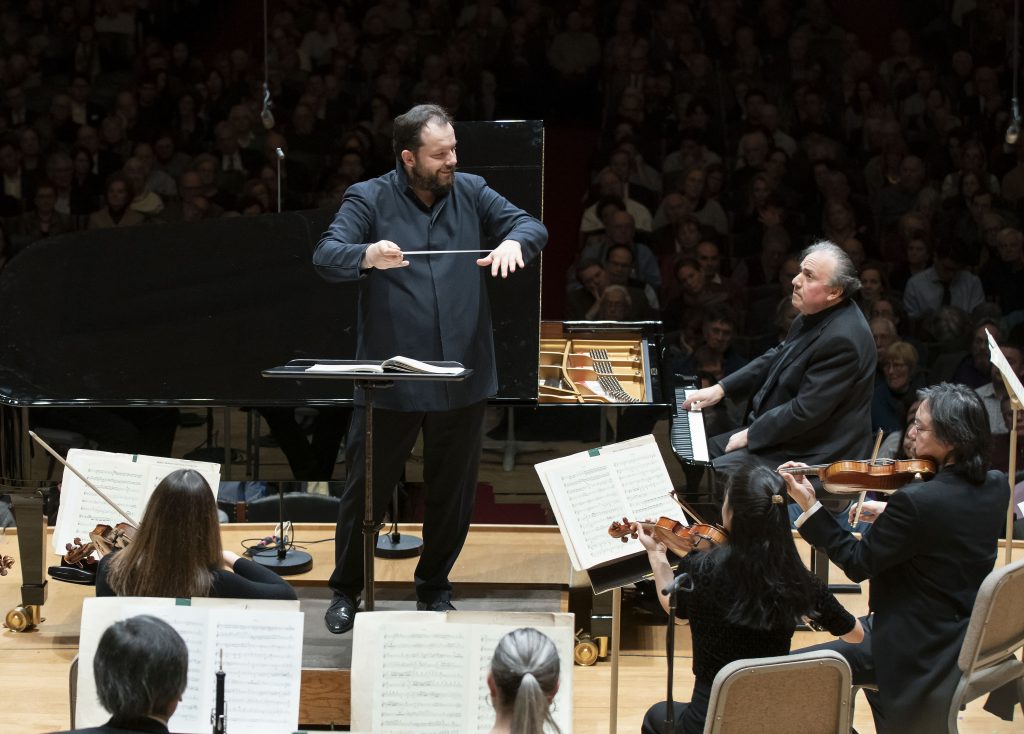Boston Symphony, Bronfman give a lively preview of canceled Asia tour

Thursday night’s concert by the Boston Symphony Orchestra and Andris Nelsons was supposed to be a final tune-up for next month’s highly-anticipated Asian tour. Alas, the coronavirus outbreak in China caused the trip’s last-minute cancellation, so the feisty travel program unveiled at Symphony Hall won’t be leaving these shores.
Certainly it was one designed to play to many of the orchestra’s and Nelsons’ strengths, sandwiching Mozart’s Piano Concerto no. 24 in between two BSO staples: Béla Bartók’s Concerto for Orchestra and the Suite no. 2 from Maurice Ravel’s ballet Daphnis et Chloé.
Though it’s travelled the world over, Bartók’s 1944 Concerto was a BSO commission and their performances of it often boast a special sense of ownership. From a technical standpoint, Thursday’s reading did just that, the BSO exhibiting strikingly robust tone, textural clarity, and ensemble-wide virtuosity.
The first movement’s woodwind-and-harp scoring, for instance, popped. So did the trumpet-string pairing near the end of the second. Mysteriously burbling woodwinds marked the closing pages of the “Elegia,” while the viola melody in the fourth movement soared and the strings gamely dug into the rustic writing of the finale.
Interpretively, though, Nelsons’ approach to the Concerto left something to be desired, generally coming across as mannered and micro-managed.
Certainly, snappier rhythms and a lighter hand might have helped the piece breathe more naturally. As it was, the opening movement and “Elegia” lacked a degree or two of edginess. Both seemed structurally disjointed, too, and might have benefited from stronger contrasts of dynamics and shadings of intensity.
A brash take on the snarky Shostakovich allusion in the “Intermezzo interrotto” notwithstanding, that movement drifted aimlessly over its latter half. And the finale – which generally came off energetically – was marred by dutiful contrapuntal episodes and a gratuitous broadening out the brasses’ last, triumphant phrase. Only the dry, sardonic “Giuoco delle coppie” danced consistently and freely.
The Ravel performance that closed the night left a stronger impression.
True, Nelsons’ approach to this 1913 favorite was broadly paced and, at times, a bit indulgent. But what sumptuous sounds he drew from the band: a gossamer opening to “Daybreak”; a lush “Pantomime” (highlighted by the impeccable Elizabeth Rowe’s radiant flute solos); and a driven, if somewhat insistent, “Danse générale.”
As a rule, Nelsons shaped the music convincingly, and balanced it so that the important voices – E-flat clarinet and double reeds in “Daybreak,” whorling flutes and clarinets in the concluding “Danse” – stood out.
He and the BSO saved their best for the Mozart, which featured Yefim Bronfman as soloist. Mozart wrote his C-minor Concerto in 1786. One of only two concerti (for any instrument) he cast in a minor key, it’s among the most turbulent of Mozart’s compositions, a reality that was particularly evident in the work’s outer movements on Thursday.
In the first, which commences quietly enough, Bronfman’s account of the solo part began by emphasizing the music’s natural lyricism, growing more stormy in tone as the piece proceeded. Throughout, his playing was rich-toned, texturally lucid, emotionally unsettled, and rhythmically snappy.
The pianist’s account of the second movement was serenity itself, and he vigorously played up the finale’s foreshadowings of Beethoven while never losing sight of the score’s foundational impulses towards clarity and proportion.
From start to finish, Nelsons and the BSO provided a wonderfully responsive accompaniment, one that was further highlighted by a riveting sense of character. Orchestral woodwinds, in particular, shined bright, especially over the central part of the gorgeous middle movement.
The program repeats 1:30 p.m. Friday at Symphony Hall. bso.org; 888-266-1200
Posted in Performances